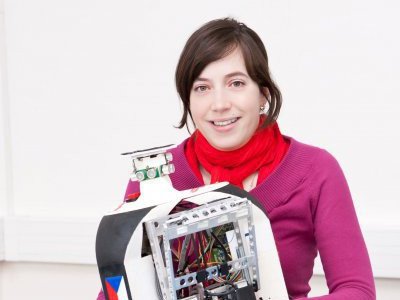I graduated from middle school in Electrical Engineering focusing on computer systems and I wanted to continue this path of study. So from the outset, FEL was the clear choice for me. Fate took me to a presentation of the Cybernetics and Robotics programme, and everything ‘clicked’. I decided to study it. On the Cybernetics course, you are taught not only to programme well, but to control any systém; for me this was mobile robots. And if you make a mistake in this process, it means not only a frozen computer, but also that the robot rides over your foot (in the best case scenario!) – oh, the benefits of practical experience.:)
After graduating from the Master's degree programme in Robotics on the programme, KyR, I worked for a company, which started up a new robotic line for Skoda. When I was in the factory testing my programme on three-metre-high robots, I remembered my squashed foot from my student days. But this work was not enough of a challenge for me, and I decided to apply for doctoral studies. Although the program KyR offers quality doctoral studies, I decided to study abroad, mostly to find out how it is done elsewhere. By chance, I came to England and specifically to Birmingham. Here I was more moved towards research in artificial intelligence that is still applied on real mobile robots.
I also had the opportunity to learn. Unfortunately, the British higher education system does not impose high enough demands on students. I think that Czech education is not only better, but puts higher (although realistic) demands on students because it is only through tough challenges that you can progress and prepare for the real world of work.
My favourite aspekt of the field of Cybernetics and Robotics is the challenge. Even now, several years on, I draw knowledge and experience from the subjects that gave me a hard time whereas my knowledge of the easy ones is long gone. Here are just a few examples from each: I recently helped a colleague understand the Fourier transformation in complex numbers, which he needed to get a robot to automatically produce a model and then learn the trajectories of people moving in an office space. I also made use of the knowledge of Real-Time Management when I opposed an article at a conference. And last but not least, it‘s always me who runs around with the robots with my measurer, solving problems, such as a year ago, when a robot went up in a cloud of smoke!. It’s me who gets down among the robots because most of my colleagues studied pure computing and the world for them begins and ends at the keyboard. But not for us Cybertechnics ... we have a whole world of possibilities.
Lenka Mudrová
